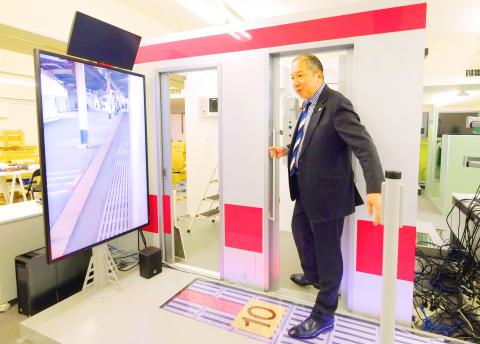Minoru Mukaiya is one of the world’s most played musicians, with millions of people across Japan listening to his songs every day — but most of them do not even notice.
Mukaiya is a composer of Hassha Merodii or “train departure melodies,” short jingles that whisk commuters on their way at some of the world’s busiest stations.
Almost no one would know his most famous track by name, a catchy electronic ditty broadcast for departures from platforms three and four at Tokyo’s Shibuya Station — the world’s third-busiest — but millions have it on their brains for hours after their commute.

Photo: AFP
Asked how many train jingles he has created, the 61-year-old former keyboard player with the jazz-fusion band Casiopea pauses. He has lost count and an assistant rushes over with a list.
“One hundred and seventy? What? I wrote 170,” he said, exploding with laughter. “That can’t be right.”
Hassha Merodii is so common now in Japan that locals are unfazed when the sharp twang of an electronic keyboard or an organ’s trill spills out of a loudspeaker, but tourists are often thrilled.
Nevertheless, Mukaiya’s work has attracted a cult following.
He has more than 34,000 Twitter followers, performs the ditties at concerts to thousands of screaming fans and is now banned from playing at Ginza Station — the epicenter of Tokyo swank — after a live show there sparked pandemonium.
Fans tell him the music is “good for their health, for their work, for walking. It warms them up,” after a hard commute to the office, Mukaiya said in an interview in his music room. “I want them to be happy.”
Hassha Merodii started when train operators were looking for ways to make their stations stand out and came up with the idea of a catchy jingle.
The songs are capped at 7 seconds — the “dwell time” train operators have to cram people into packed commuter trains and still, famously, run on time.
A spokesman for the JR East train company said they were introduced “to prevent passengers from dashing onto the train.”
However, despite the short time frame, Mukaiya said that each ditty packs in a story.
In Japan’s ancient capital Kyoto, “we have a deep respect for culture, so the song sounds more respectful of Japanese culture,” he said, sandwiched between musical instruments and computer screens.
The rapturous crescendo and rising pitch in Shibuya Station’s departure song, on the other hand, is a nod to the train’s uphill journey to the next platform.
“The Toyoko Line used to be up the stairs on a very high level, but now the Toyoko Line has moved to the subway and the journey from Shibuya to the next station is a very steep slope,” he said. “So I thought the departure song... needs to make it feel like the mountain train.”
Other jingles nod to local history. The station at Takadanobaba, the home to popular anime series Astro Boy, pays homage to the cartoon with a jingle version of the show’s theme tune.
And Osaka station features a soundbite of I Guess I Really Do Love You, one of the region’s most famous songs.
One of the distinguishing features of Mukaiya’s work is that the individual tunes at each station along a line can be combined to form a coherent song.
The jingles have allowed Mukaiya to combine his two passions, music and trains.
His interest in railways was first kindled as an eight-year-old when Japan’s first ever Shinkansen bullet train glided into Tokyo Station a week before the 1964 Tokyo Summer Olympics.
“I thought that this is a kind of science fiction world,” he said.
Two decades later, he released one of the world’s first train simulator video games for fellow enthusiasts, amassing a huge following and nabbing the attention of industry stalwarts like PlayStation.
The game was so realistic that train operators around the country started asking Mukaiya to design something similar to teach their conductors and drivers.
He even designed a life-sized mock-up of a train conductor’s compartment — complete with control panel — that occupies pride of place in his office.
Staring out to an imaginary platform, he rings a bell — confirming the train is clear to leave — and assumes his position at the wheel, watching the monitor above for the traffic light to turn green before taking off.
When the train pulls into the next station he walks back over to the carriage door, grinning. A makeshift platform projected from overhead, the No. 10 appearing at his feet. He has lined up the train doors with the platform exit perfectly.

Philippine President Ferdinand Marcos Jr has fired his national police chief, who gained attention for leading the separate arrests of former Philippine president Rodrigo Duterte on orders of the International Criminal Court and televangelist Apollo Carreon Quiboloy, who is on the FBI’s most-wanted list for alleged child sex trafficking. Philippine Executive Secretary Lucas Bersamin did not cite a reason for the removal of General Nicolas Torre as head of the 232,000-member national police force, a position he was appointed to by Marcos in May and which he would have held until 2027. He was replaced by another senior police general, Jose

STILL AFLOAT: Satellite images show that a Chinese ship damaged in a collision earlier this month was under repair on Hainan, but Beijing has not commented on the incident Australia, Canada and the Philippines on Wednesday deployed three warships and aircraft for drills against simulated aerial threats off a disputed South China Sea shoal where Chinese forces have used risky maneuvers to try to drive away Manila’s aircraft and ships. The Philippine military said the naval drills east of Scarborough Shoal (Huangyan Island, 黃岩島) were concluded safely, and it did not mention any encounter with China’s coast guard, navy or suspected militia ships, which have been closely guarding the uninhabited fishing atoll off northwestern Philippines for years. Chinese officials did not immediately issue any comment on the naval drills, but they

POWER CONFLICT: The US president threatened to deploy National Guards in Baltimore. US media reports said he is also planning to station troops in Chicago US President Donald Trump on Sunday threatened to deploy National Guard troops to yet another Democratic stronghold, the Maryland city of Baltimore, as he seeks to expand his crackdown on crime and immigration. The Republican’s latest online rant about an “out of control, crime-ridden” city comes as Democratic state leaders — including Maryland Governor Wes Moore — line up to berate Trump on a high-profile political stage. Trump this month deployed the National Guard to the streets of Washington, in a widely criticized show of force the president said amounts to a federal takeover of US capital policing. The Guard began carrying

Ukrainian drone attacks overnight on several Russian power and energy facilities forced capacity reduction at the Kursk Nuclear Power Plant and set a fuel export terminal in Ust-Luga on fire, Russian officials said yesterday. A drone attack on the Kursk nuclear plant, not far from the border with Ukraine, damaged an auxiliary transformer and led to 50 percent reduction in the operating capacity at unit three of the plant, the plant’s press service said. There were no injuries and a fire sparked by the attack was promptly extinguished, the plant said. Radiation levels at the site and in the surrounding